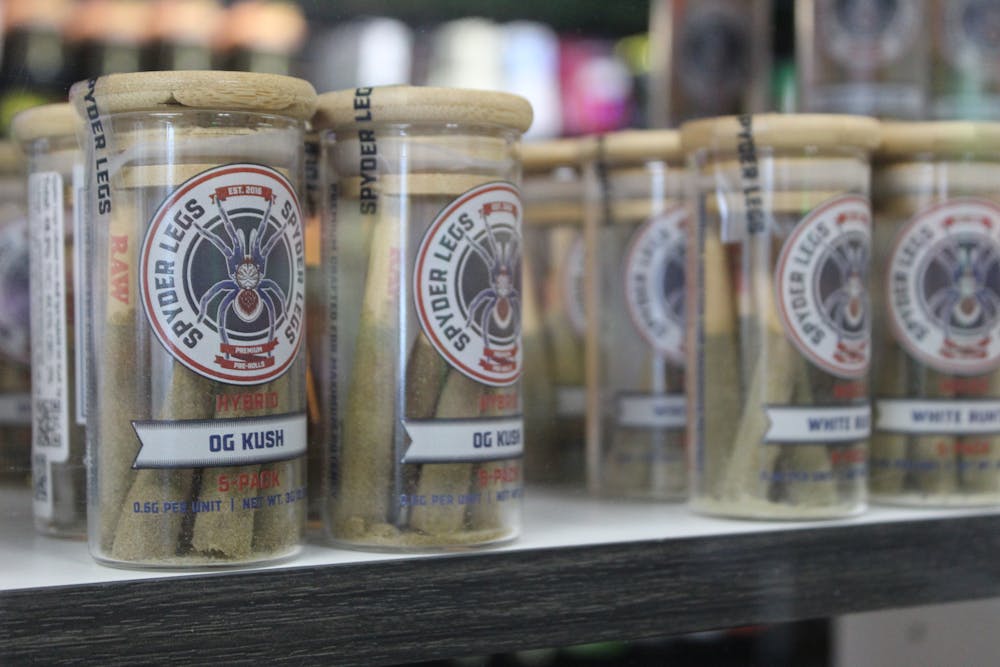The end of an era?
Michigan's recreational cannabis industry faces harsh new challenges

Michigan is producing nearly 30,000 more pounds of marijuana flower than it did in January of last year. The price of that flower is 28.6% lower. For recreational marijuana users, this is a dream come true.
For recreational growers and retailers, this decrease is a nightmare.
The price of recreational cannabis, specifically marijuana flower, has been declining since its legalization in 2019. This trend is largely due to the significant rise in licensed retailers over the years, resulting in an oversaturated market and increasingly competitive pricing.
John Norkowski, inventory lead of Mint Cannabis in Mount Pleasant, said that these factors are greatly impacting the standards and economy of the industry.
“I think we’re very close to hitting a rock bottom pricing, where you can’t really go any lower and continue to have any quality,” Norkowski said. “There’s always gonna be somebody cutting a deal and making something new, but, we’re at that threshold where you almost can’t pay people that are making the stuff to get it in here.”
According to Michigan’s Department of Licensing and Regulatory Affairs, there are currently over 900 retailers with adult-use establishment licenses in the state, nearly 11 times the amount in March 2020.
Nick Young, Western Michigan University Professor and CEO of Krystilion Hemp Dispensary said that the approximately five-to-one ratio of growers to retailers is another key contributing factor to the decreasing cannabis prices.
“The retailers control a decent amount (of pricing) because they are the outlet to the consumer,” Young said. “So they’re going to still make their margins, even though 15% of $60 is obviously quite a bit less than 15% of $100. What ends up happening is each transaction is worth less profit and a lot of these retailers are now zoned in a way where it’s heavily competitive.”
Lena Granzo, keyholder employee of Levels Cannabis in Mount Pleasant, said that the retail industry has become “a heck of a lot more competitive” over the years, as customers disperse to a variety of dispensaries rather than the previously centralized customer base.
General Manager of High Society, Madisyn Tengdin, had a different perspective on the matter.
“(The increase in competition) definitely brought us an opportunity to try and be better with our customer service and just give it our all,” she said. “I would say it’s been more of a motivating factor for us.”
The recreational marijuana industry’s exemption for wholesale tax in Michigan has allowed hundreds of businesses to thrive in this increasingly competitive market, but that may be about to change.
Michigan Governor Gretchen Whitmer has proposed a long-term “Mi Road Ahead Plan” to “fix the damn roads”, which includes a redirection of gas taxes, the contribution of large corporations and a wholesale tax on the marijuana industry.
Whitmer’s February press release read that this wholesale tax will add $470 million to the plan, helping to fix roads across the state.
“The Mi Road Ahead Plan will close a loophole that exempted the marijuana industry from wholesale tax, which is applied to similar smoking products, like cigarettes and other tobacco items,” the press release stated.
The current tax on non-cigarette tobacco products is 32% of the wholesale rate, which retailers say could be detrimental to businesses if similarly enacted in the recreational marijuana industry.
Young said that although the wholesale tax may help Michigan’s government ensure the collection of retailers’ bills to growers, it could pose a very real threat to the current state of the industry.
“I think (the wholesale tax) is going to cause the entire market to have to completely reset,” Young said. “(Who) it’s really going to hurt are probably a lot of the smaller businesses who just won’t be able to absorb it or won’t be able to really pass it along. They’re going to be in big trouble.”
“I think that this industry is gonna take a pretty decent hit for the next couple of years,” Granzo said. “I don’t think it’s going to completely kill the industry, but I do think it’s going to be a huge hindrance until there’s that adjustment period after (the tax) comes into effect.”
Granzo said that she worries the adjustment period, if the wholesale tax is implemented, would not only impact the recreational businesses, but their less financially-stable customers as well.
“A lot of people are using marijuana to almost self medicate,” she said. “I know a lot of veterans that come (in) that have it a little bit rough, and medical care is out of their reach, but this is always here for them and this works. Those are the people that I worry about the most.”
The continued decline of cannabis prices and the possible introduction of a new tax seem to be posing a threat to the flourishing industry of recreational marijuana.
Some retailers, such as Norkowski, believe that local businesses may begin to close as a result.
“People aren’t going to be able to keep up,” he said. “Maintaining people in the store, paying them. And their rent’s not cheap, products are not cheap, the electricity is not cheap. Everything adds up.”
While the fate of the recreational marijuana industry appears to be currently undecided, retailers are doing what they can to succeed.
“We’re all positive, trying to move forward, do the best we can,” Norkowski said.






